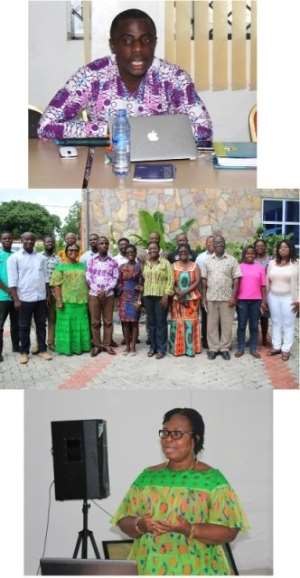
Koforidua, June 26, GNA - The Country Director for Send-Ghana, a non-governmental organisation (NGO), Mr George Osei-Bimpeh has called on journalists to be more innovative and creative by going beyond reporting on speeches and do in-depth stories based on well researched and authentic sources.
He said journalists must write more in-depth stories based on research that educated and informed the public on developmental issues.
Speaking at a two-day at a two-day training programme for journalists from Ghana News Agency (GNA) and Media and Communication Advocacy Network (MCAN) on the United States Agency for International Development (USAID), People for Health (P4H) Project in Koforidua, Mr Osei-Bimpeh said the media played a critical role in shaping the nation and there was the need for them to use the power they wielded to bring out developmental issues for redress.
He noted that Ghana had come a long way in implementing policies relating to health and other developmental issues, however the media reportage, 'has not been structured well enough to capture issues to its logical conclusion for the understanding and participation of the citizenry'.
The P4H project seeks to strengthen organisational and institutional capacities of government and civil society organisations (CSOs) for mutual accountability in health, HIV, water and sanitation, and nutrition policy formulation and implementation.
It is a five-year project being implemented by a consortium of three organisations led by SEND-Ghana, with Penplusbytes another NGO and the Ghana News Agency as members, and sponsored by USAID.
The project is being implemented in 15 districts of Greater Accra, Eastern, Northern and Volta regions.
The training programme took participants through the project concept, the role of the media in reaching the set goals and targets of the project using the Ghana Health Service Patients Charter and the Code of Ethics.
As part of the project, digital dashboard involving the use of mobile phones and social media would be provided in the implementing districts to enable the citizenry to give feed backs and inputs into health policies and programmes would be collated as evidence by the consortium to demand answers and policy changes in the health sector to ensure equitability and accessibility.
The Director of Editorial at the GNA, Mrs Yaa Oforiwah Asare-Peasah, said the country had made gains in the provision of healthcare services, however, but maternal deaths, HIV infections and malaria and inequality in service delivery to the key population remained a challenge.
These she said had contributed to poor healthcare delivery leading to regional disparities and discrepancies in service provision related to sex, gender, age, occupation and socio-economic status.
'GNA is coming on board as an implementing partner of the project with many years of communication experience and expertise to help empower the citizenry to know their rights and to advocate changes in the health sector for their benefit,' she said.
She said GNA, established as the communication arm of the government and the only wire service in the country would in no doubt deliver on their mandate in the P4H project.
Mrs Asare-Peasah and urged the participating journalists to show passion, commitment and diligence to realise the objective of the project.
Dr Doris Aglobitse, Patron of MCAN said the organisation had been very instrumental in achieving most of the targeted goals under the Millennium Development Goals and the media being critical in setting the agenda for policy interventions, she was hopeful that with the expertise of the GNA, the media target of the project would be realised.
GNA
By Bertha Badu-Agyei, GNA




 'Kill whoever will rig Ejisu by-election' – Independent Candidate supporters inv...
'Kill whoever will rig Ejisu by-election' – Independent Candidate supporters inv...
 Ashanti Region: ‘Apologize to me for claiming I owe electricity bills else... – ...
Ashanti Region: ‘Apologize to me for claiming I owe electricity bills else... – ...
 Ghana is a mess; citizens will stand for their party even if they’re dying — Kof...
Ghana is a mess; citizens will stand for their party even if they’re dying — Kof...
 Internet shutdown an abuse of human rights — CSOs to gov't
Internet shutdown an abuse of human rights — CSOs to gov't
 Free SHS policy: Eating Tom Brown in the morning, afternoon, evening will be a t...
Free SHS policy: Eating Tom Brown in the morning, afternoon, evening will be a t...
 Dumsor: A British energy expert 'lied' Ghanaians, causing us to abandon energy p...
Dumsor: A British energy expert 'lied' Ghanaians, causing us to abandon energy p...
 What a speech! — Imani Africa boss reacts to Prof. Opoku Agyemang’s presentation
What a speech! — Imani Africa boss reacts to Prof. Opoku Agyemang’s presentation
 Dumsor: Tell us the truth — Atik Mohammed to ECG
Dumsor: Tell us the truth — Atik Mohammed to ECG
 Dumsor: Don't rush to demand timetable; the problem may be temporary — Atik Moha...
Dumsor: Don't rush to demand timetable; the problem may be temporary — Atik Moha...
 Space X Starlink’s satellite broadband approved in Ghana — NCA
Space X Starlink’s satellite broadband approved in Ghana — NCA
